Table of Contents
Table of Contents
- 1. Not Knowing The Ideal Client
- 2. Not Knowing The Practice Area
- 3. Lack of Client-centric Educational Content
- 4. Ignoring Customer Reviews
- 5. Not Outsourcing Your Marketing Tasks
- 6. Not Respecting Ethics Rules
- 7. Not Having a Custom SEO Strategy
- 8. Ignoring Social Media
- 9. Not Monitoring Competitors
- 10. Not Focusing On Branding
- 11. Not Tracking Progress
- Closing Thoughts
7,000+ agencies have ditched manual reports. You can too.
Free 14-Day TrialQUICK SUMMARY:
This article shares legal marketing tips for agencies with law firm clients, including how to navigate strict regulations, intense competition, and frequent Google updates. Learn about 11 common legal marketing mistakes and get actionable solutions to boost lead generation and visibility in search results.
Legal marketing is far more complicated than other businesses because of compliance, governance, and strict rules for promoting legal services. What’s more, fierce competition and catastrophic Google updates have left a lot of law firms without a viable source of new leads.
According to this Thomson Reuters report, 30% of small law firms (surveyed 708 law firm owners and 73 small firm lawyers in the USA) noted “marketing or advertising” as one of their top three challenges.
At LawRank, a legal marketing agency that has worked with attorneys for decades, we noticed the biggest mistake they make is not marketing their practice. Whether they don’t know how to do it or are just terrified of getting a negative public perception of their profession, creating and embodying a solid marketing plan can be overwhelming.
If your agency has clients in the legal niche, you know how important it is to get their firm’s name out there before they get shut out by the competition.
So how does LawRank provide legal clients with a 384% increase in first-time calls and a 603% growth in traffic in 12 months? What common legal marketing mistakes did we face by ourselves, and see other law firms make, along with solutions to help you avoid them?
Let’s dive into these mistakes and find solutions to them.
1. Not Knowing The Ideal Client
One of lawyers' biggest marketing challenges is not understanding their ideal client. If they don’t know who your best client is, then their marketing efforts are a waste of time and money.
Just as with any marketing strategy, your agency needs to take your client’s audience specifically into account. For example, you wouldn’t expect to reach a young woman looking for help with medical negligence in the same way you would reach an older woman dealing with cancer treatments and looking to get the compensation she deserves.
Fortunately, today’s digital avenues allow highly targeted marketing to reach individuals who need your services at the right time.
💡Solution: Determine Your Ideal Client Profiles and Build Multiple Persona Profiles
To get started, we suggest asking and answering the following questions:
Who is the ideal client? (gender, age, race, marital status, hobbies, buying traits, etc.)
What are the pain points of these ideal clients? What are their goals?
Do these clients align with the firm’s values and practice areas?
What is the level of urgency for their case?
What problems are you solving for these clients?
That is the first step to eliminating one of the most troubling legal marketing mistakes. Once you identify the best client, write a short bio and details about them, such as work style, education, income level, profession, and legal concerns.
However, many law firms must develop more than one persona since different parts of the firm’s business may target different end customers. For example, you can build personas for someone recently retired and looking to prepare a will and someone under 40 dealing with the unexpected loss of a parent because of an accident or negligence. In this case, creating multiple personal profiles that count the details of your primary customers is essential.
Even if you are targeting many types of clients, there is no need to create a buyer persona for every person you are trying to reach. Instead, focus on two or three target clients who comprise most of the business.
2. Not Knowing The Practice Area
General law practices are the biggest mistakes for marketers. As the saying goes, Jack of all trades, master of none. This phrase applies here in a negative way. This broad-stroke approach tells people that the law firm exists but doesn’t give them any clear indicator of the services offered instead of choosing one or two more major focuses.
It’s like promoting a restaurant but not providing any sense of the type of food offered.
Lawyers and small firms should be fully aware of their area of legal expertise and their “vertical market” or agency’s niche focus. The last one helps you to decide who you want to target as the potential clientele. The more you narrow your focus, the more chance of getting who you want to serve and growing a successful business.
💡Solution: Choose A Practice Area and Focus Your Marketing Efforts There
Make sure to pick a full practice area, for example, divorce, personal injury, or bankruptcy. If you can’t choose a niche because of the geographical location or difficulties with the law firm’s employee makeup, you can do a few things:
Create well-optimized pages for each practice area and location with valuable content around keywords. Include case examples and avoid using legal jargon to improve readability for people and search engines;
Focus on hyper-localized marketing within the community or geographic area. Verify and manage the firm’s Google My Business profile to stand out in search results with the knowledge panel. List the law firm in online directories and community-based organizations.
Add all appropriate social media accounts to your Google My Business to help customers discover the firm easier.
3. Lack of Client-centric Educational Content
Creating content is challenging. Making legal, educational content is even more complex and different from standard content writing. Why? There are potential roadblocks with legal knowledge. You should create content that offers accuracy and solutions to the customer’s pain points and needs.
Law firms must demonstrate industry leadership by conveying valuable information to clients to showcase their expertise or risk losing to the competition.
💡Solution: Get the Best Content Writing From Legal Experts
You may feel the difference between a writer and a subject matter expert. Lawyers are subject matter experts, but finding two-in-one specialists to write super educational and legal content is challenging.
What is the solution? Create a steering team.
In our case, the steering team approach is one of the most effective ways to produce legal content that covers each step of the client journey. The team includes the perfect mix of attorneys (content owners) and marketers.
Marketers manage the process and contact attorneys to turn their knowledge into effective client-centric content. This approach allows your team to create “on-brand” legal writing with the three C’s in mind (counterarguments, concessions, and credibility) that helps appeal to potential clients.
Google loves in-depth authoritative content, so as long as it's thorough, the length of the post matters less than the quality of the content.
4. Ignoring Customer Reviews
Online reputation can make or break a law firm. Online reviews play a huge role in the legal world. Unfortunately, many law firms underestimate this tool. This survey suggests 98% of customers read online reviews of attorneys before hiring them.
A poor online reputation will quickly derail a firm, even if it gets high rankings for the right keywords. Online reviews are becoming essential for customers wanting to hire a lawyer. People want to deal with attorneys they can trust, and authentic reviews from real customers can help. You can also learn from every negative review and inspire positive changes within the law firm.
💡Solution: Manage Reviews on Google My Business
Once you verify the law firm’s Google Business profile, gather online reviews from clients. Hunt for them with attorneys at the end of service supply and ensure your ongoing clients are satisfied with your work. You can ask the firm’s clients to leave reviews to help others discover all the ins and outs of working with the firm. These, in turn, will affect the purchase decision of potential clients.
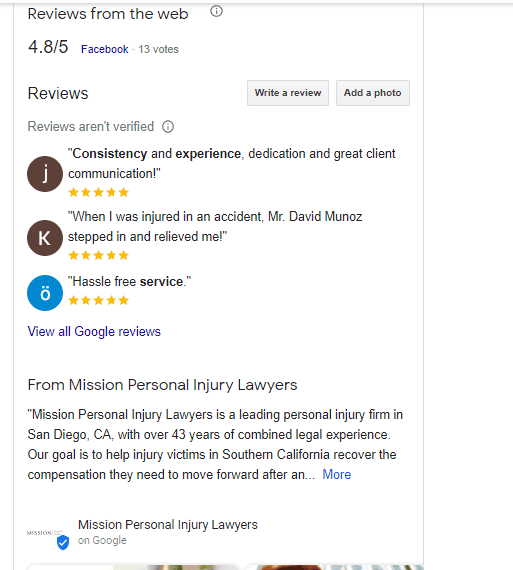
Set up notifications if you don’t want to find out about a bad review a month later. Even if you get a terrible review, craft a professional response. Avoid frustrating and confusing an already unhappy client, and admit fault where necessary. Most people understand that businesses aren’t perfect, and engaging with reviewers can help change negative perceptions into positive ones.
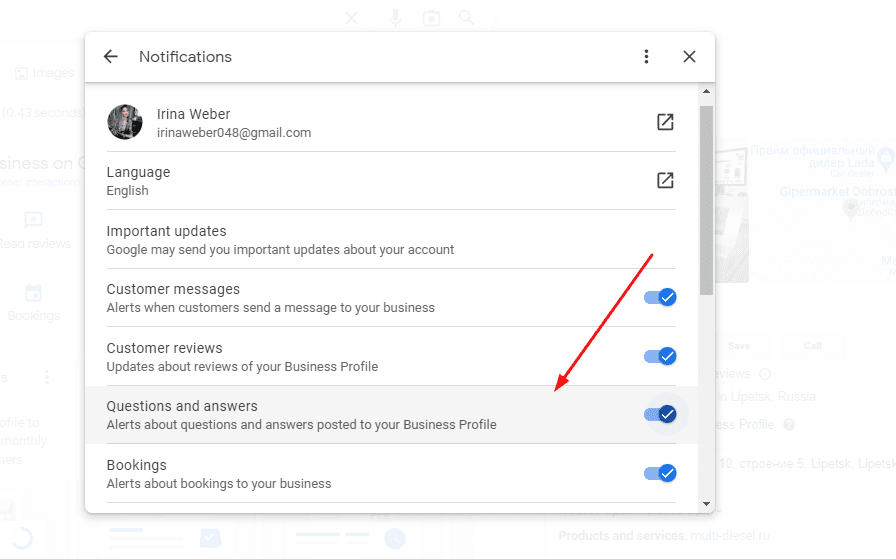
Avoid fake reviews, as Google can detect spam, self-advertising, impersonations, or off-topic comments. Moreover, other users can flag a firm’s reviews if they violate Google’s policies. Monitor reviews monthly and respond politely and gratefully to all of the reviews.
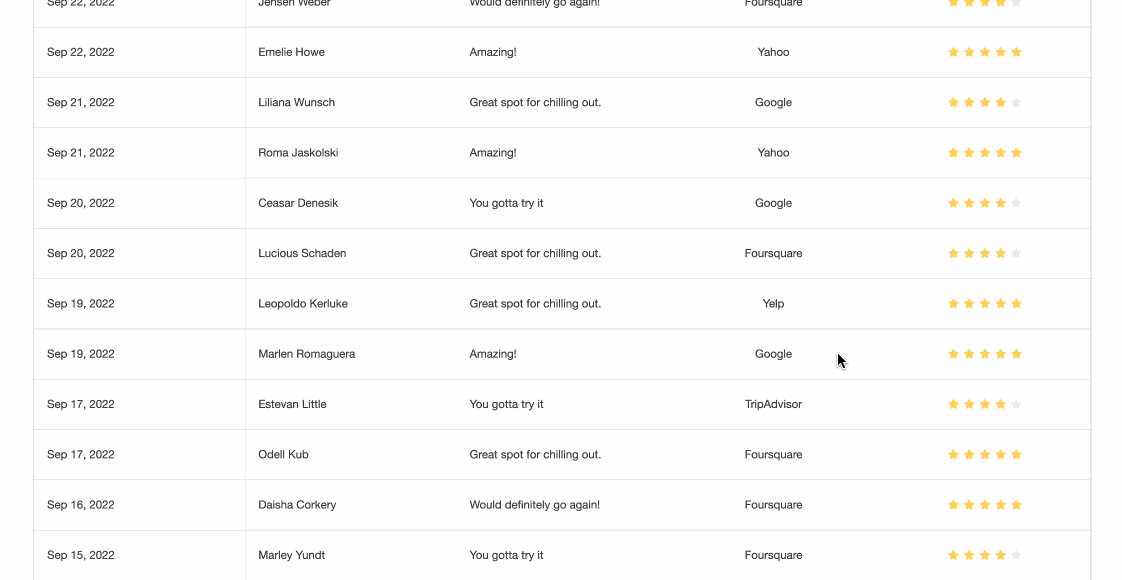
Streamline Your Client’s Review Management All In One Place. Try It Free in AgencyAnalytics for 14 Days!
5. Not Outsourcing Your Marketing Tasks
Most lawyers don’t have enough resources to market effectively and try to do everything at once. As the saying goes, kill two birds with one stone. It is great to be enthusiastic about marketing a law firm but stay focused on one task before jumping to another.
Moreover, you can always turn to market experts for the best results. According to this report, 80% of law firms prefer outsourcing some of their legal marketing tasks because they easily get overwhelmed instead of focusing on strategic, board-level tasks.
💡Solution: Hire Marketing Professionals to Handle Daily Marketing Routines
Outsourcing marketing can solve many law firms’ current challenges, including social media, PPC, email marketing, etc. Delegating these tasks to marketing professionals frees up the firm’s time serving clients and referral sources.
As one of our past clients, Sagi Shaked, said, “The key is not spending time but investing it. It’s significant to outsource non-billable work to a third party, as I did to Law Rank. If you really want to help your clients, the first step is to help yourself”.
But when a law firm is looking to hire a marketing expert, they need to be cautious about who they partner with. After all, it’s the law firm’s reputation on the line. Research and check out those marketers you want to work with to protect your law firm. You can even contact their happy customers or other firms to which they’ve already provided services.
Agency Tip: Providing case studies that showcase your team’s success with other law firms will help reinforce your expertise in this area.
6. Not Respecting Ethics Rules
Most lawyers don’t fully understand the disciplinary rules regarding client representation and make ethical mistakes. One of the biggest fears many lawyers have is that they will cross the lines regarding what they can do to market their law firm. After all, ethics rules restrict many marketing options.
Unfortunately, this is a genuine concern as advertising and the American Bar Association rules vary from state to state but generally follow some standard guidelines. Law firms must promote their marketing messages as vigorously as they can without violating guidelines for state and national bar associations.
💡Solution: Strictly Follow American Bar Association Rules and State Requirements
To make sure the firm’s license isn’t at risk, get familiar with state-based specifics, and get an insight into the ABA rules for lawyers. Everyone, from the contact at the law firm to the marketing partners, needs to be on the same page with the same rules.
Here are some of the most common marketing things addressed in ethics rules for lawyers and how to avoid them:
Avoid using terms like “specialist” or “best” in marketing messages;
Don’t make promises or guarantee wins in marketing messages;
Use disclaimers that your posted content is not legal advice and is not subject to attorney-client privilege.
Don’t reveal client information or private case unless the client gives informed consent;
Don’t lie about your qualifications in advertising.
7. Not Having a Custom SEO Strategy
Most law firms fail at marketing because they consider that SEO is not an essential tactic for them. One of our clients said, “Legitimate prospects don’t search for “IP patent law services in Los Angeles” in Google because they prefer turning to their investors, colleagues, or friends for recommendations.” And he is partially right.
However, law firms that lack focus and commitment to a solid SEO strategy for lawyers won’t be found for patent law in Google and won’t attract new prospects to their business. Therefore, make the most of these searches and build effective SEO strategies to be found for content on target topics.
💡Solution: Follow SEO Best Practices
Due to constantly changing algorithms, the tactics and channels you use may shift over time, but the primary purpose of search engines is to show web results that address the searcher’s query.
Take time to create a clear marketing plan for the law firm that will help you meet the goals and execute your SEO strategy. The higher the firm’s site ranks in Google, the more visible the law firm becomes.
Here are some things you can do:
Create optimized pages (page titles, meta descriptions, short and descriptive URLs, internal links, etc.)
Ensure your firm’s website follows all of Google’s guidelines on technical SEO, is easy to navigate, and is mobile-friendly
Remember the audience’s needs and pain points while developing a content strategy. Create content for each stage of the marketing funnel
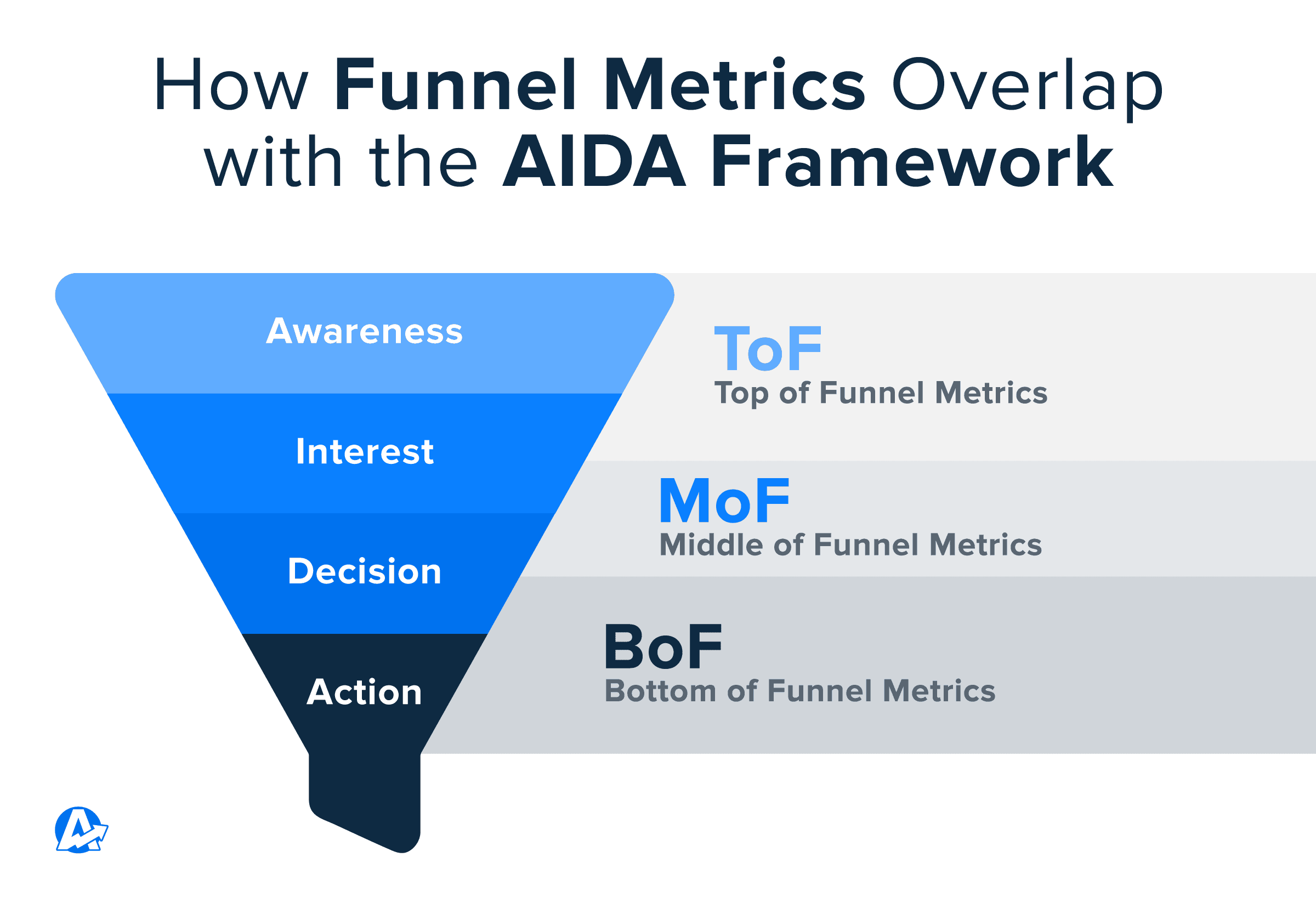
To attract people with higher “buying” intent, include bottom-funnel service-based keywords in the appropriate service landing pages.
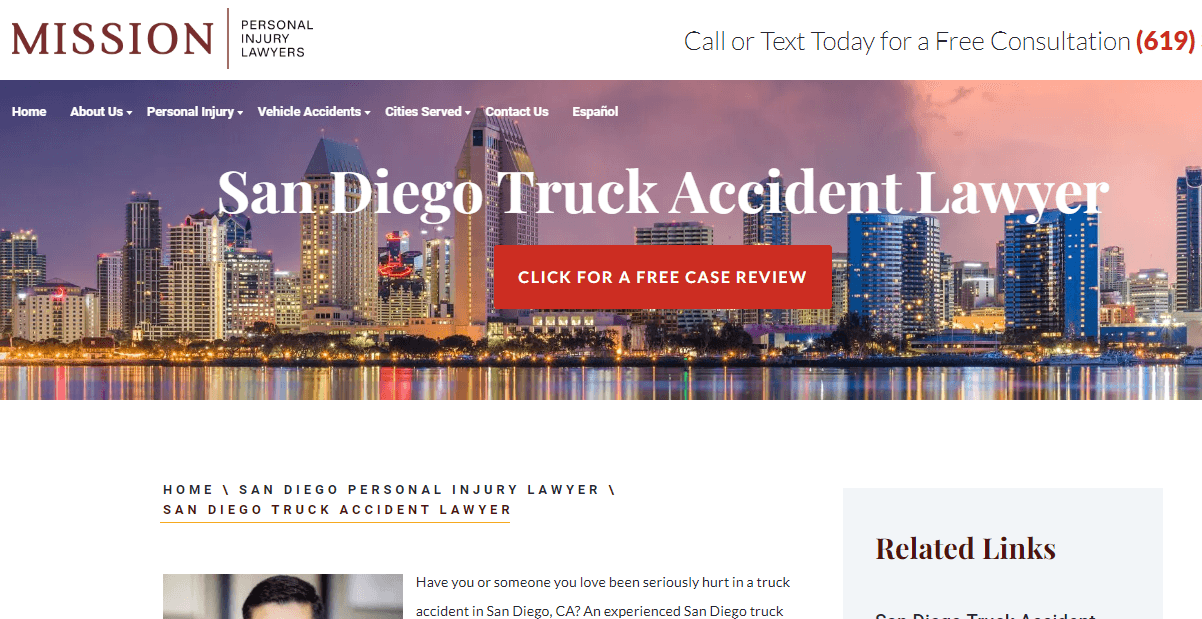
Help the target audience be aware of their problems and answer their questions by creating informational posts around higher volume informational keywords.

Optimize the firm’s Google Business Profile.
Claim all of the firm’s online profiles to build your presence and links.
8. Ignoring Social Media
Social media is another area where lawyers need clarification about where to be. No matter your thoughts on social media today, it is not enough to have just one website to improve a firm’s online presence.
More and more law firms turn to remote work, and using the right social media channels will help build direct relationships and start a conversation with people you want to reach.
💡Solution: Select a Few Social Channels and Stick to Them
A survey conducted by the ABA revealed that 82% of small law firms got new clients through social media marketing. In saying this, building an established social media presence and finding the right social media channel to meet your goals is recommended. Pick a couple of channels and stick to them.
9. Not Monitoring Competitors
The legal industry is crowded with competition. Many lawyers have difficulties keeping up with their competitors because it is easier for potential customers to shop and compare online using different legal directories. Ultimately, most attorneys can’t follow the latest trends and technology to give them the needed edge.
💡Solution: Watch the Competition
Understanding the competitor’s strengths and weaknesses is essential to staying ahead. Knowing what keywords competitors are getting higher rankings than you aren’t will help you find critical gaps in your content strategy.
Fortunately, there are a lot of marketing tools like WebCEO and other competitor analysis tools and SEO competitor analysis best practices to dig into direct competitors and which ones in the area are doing the best job of ranking at the top. Using competitor insights will help you get some ideas to make the practice’s marketing strategy more successful.

10. Not Focusing On Branding
Many lawyers fail by focusing on promoting themselves–not serving their clients. Instead of focusing on who they serve, they think about who they are. As a law firm, thinking about the clients and what you can do for them is essential.
That’s where law firm branding comes into play. The more recognizable a brand is, the more new clients the firm will get through word-of-mouth recommendations from current clients.
💡Solution: Focus on Your Clients
When branding a law firm, answer the following questions:
What does the law firm do better than others?
What factors influence new clients when they hire a lawyer?
What are the brand’s core values and mission in your marketing message?
What experience do past clients have with the firm? What things do they remark about that experience?
Once you answer these questions, you can focus on why people hire law firms in the first place and solve a specific set of problems for a particular set of clients. You should reflect on what matters most to potential clients, their perceptions of their legal issues, and what it means to work with lawyers.
Here are other tips you should consider:
Maintain consistency in customer interaction, whether the firm delivers quality work on time or excellent customer service.
Positioning Matter. Ensure the firm handles specific kinds of problems rather than providing general solutions.
Give knowledge-based solutions aimed at the needs of potential clients.
11. Not Tracking Progress
Measuring progress is a common challenge in the legal space. You can’t expect to get results if you can’t prove what works and what doesn’t work for the law firm. Many firms don’t use the data to improve their marketing efforts.
A good marketing plan is just your benchmark, and what is more important in your project is to outline key performance indicators and track them against any goals you’ve set. Don’t overload your team with too many KPIs, as it’s difficult to analyze your marketing results when focusing on too many things.
💡Solution: Monitor the Right Growth Metrics
Track KPIs to ensure the firm’s marketing strategies meet the goals. When measuring performance, looking at the right growth metrics is critical.
Here are some high-value KPIs to include in your reporting dashboard:
Organic traffic (traffic from branded and non-branded keywords);
Open rates on email campaign;
Number of keyword rankings on the first page of Google;
Number of inbound calls and new clients from calls each month;
Number of reviews or case studies received each month;
The average conversion rate for landing page visits;
Average fees won per client.
Agency Tip: Simplify client reporting and showcase results effortlessly with a customizable law firm marketing report template—designed to meet the unique needs of legal marketing
Reporting platforms like AgencyAnalytics automate client reporting and connect all a law firm’s marketing metrics under one roof. You can quickly spot downward or upward trends and adjust your marketing strategy for trends as needed.
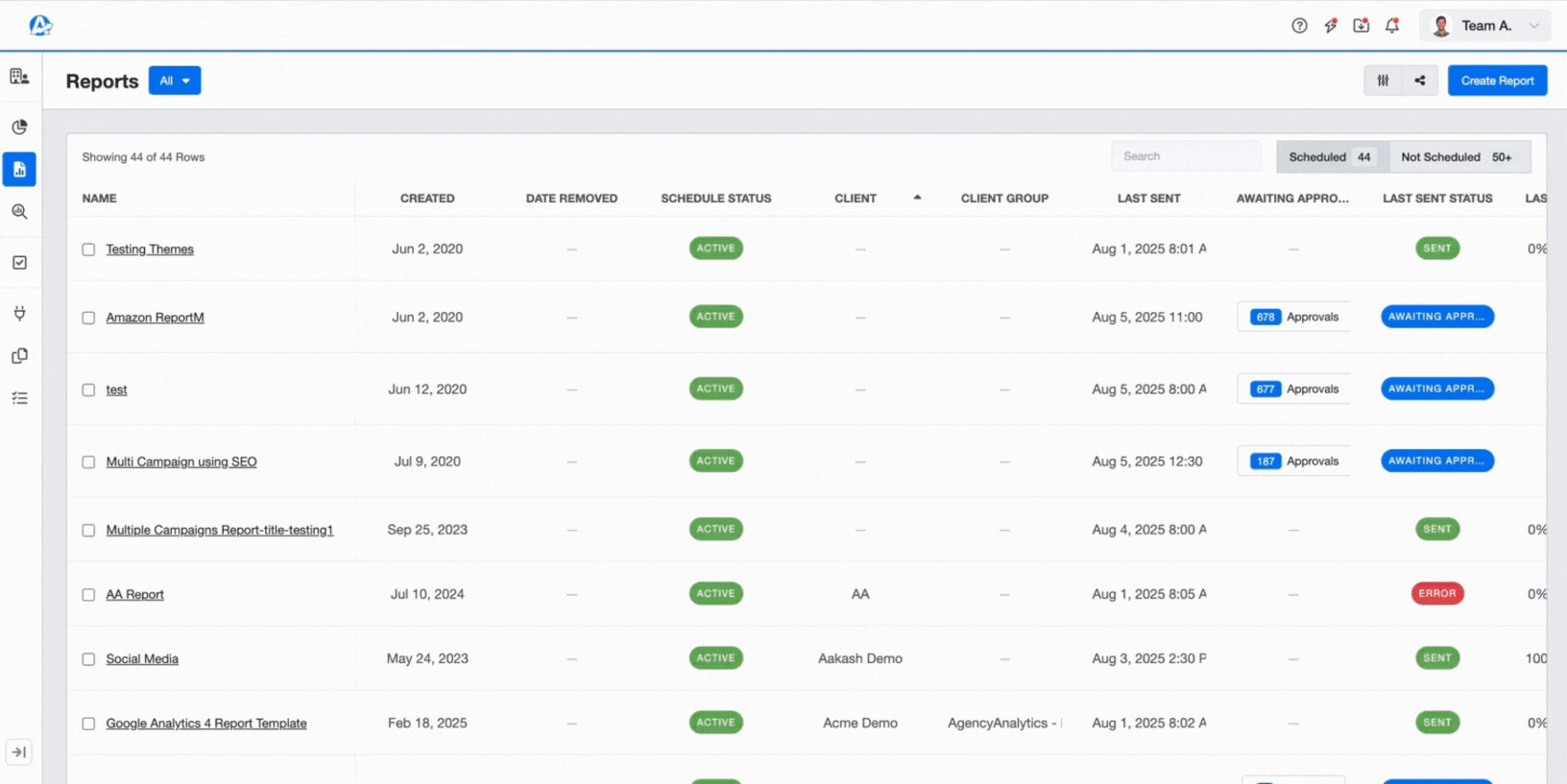
House All Your Clients’ KPIs Under One Roof. Retain Clients With White Labeled Reports Made in Minutes. Try AgencyAnalytics Free for 14 Days.
Closing Thoughts
Legal marketing is essential for growth but is also laden with obstacles and mistakes. If you fail to master the nuances of digital marketing in the legal niche properly, the negative consequences can be significant.
Law firms can’t exist without clients, and clients can’t find a firm if it doesn’t appear at the top of Google search results. Fortunately, you now know the common marketing challenges facing law firms and can avoid them in the future.

Written by
Irina Weber is a content strategist at LawRank. She loves helping brands create, publish, repurpose, and distribute content through marketing channels. She regularly contributes to media outlets like SEW, Adweek, SME, SMT, CMI, etc.
See how 7,000+ marketing agencies help clients win
Free 14-day trial. No credit card required.






